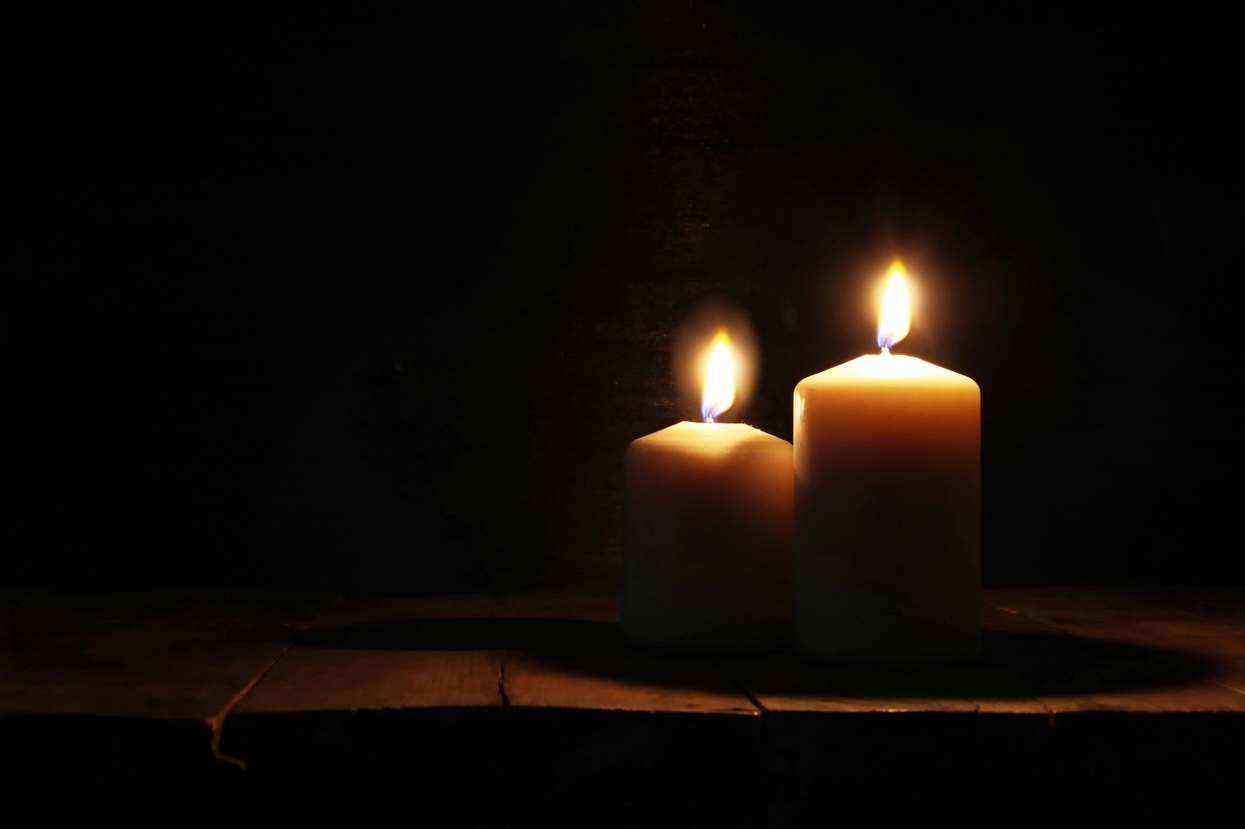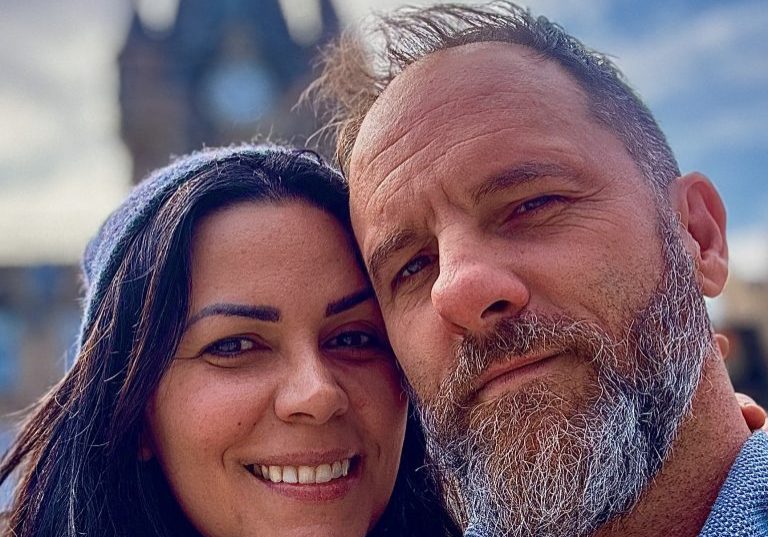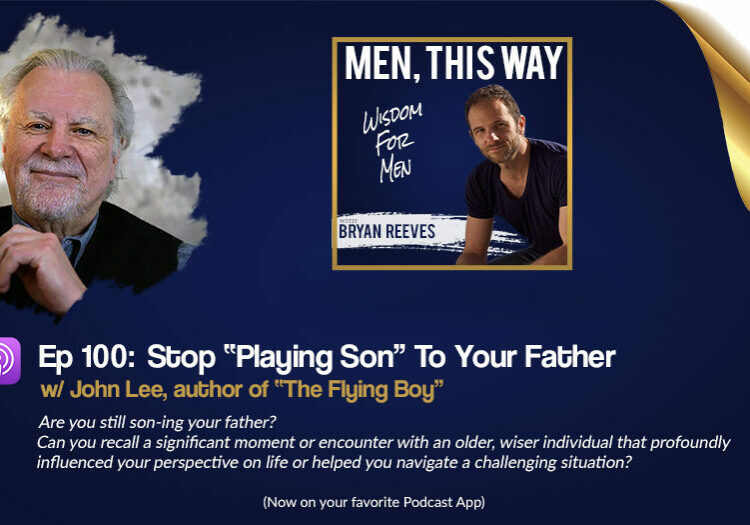♦◊♦
About a year ago my wife and I lost an unborn baby. Three months later I fully lost my father.
In less than a trimester any dreams of fatherhood I still had – of either being one or finally having the one I was born to – were annihilated by Life’s sometimes cruel whimsy.
This has been a particularly confusing journey of grief – perhaps all grief journeys are. There are no bodies to mourn over, no gravesites to visit. My father still walks among the living, and our baby was never even conceived.
It’s difficult to articulate the disorienting limbo thrust upon me by these two near-simultaneous events.
I suddenly felt as if suspended in space and time, my lineage cords to both ancestor and descendant severed by the loss of both child and father.
I’ve known loneliness before. I’ve known lost in the world before. This was an entirely unfamiliar flavor of aloneness.
For I didn’t merely feel lost in the world, I felt lost to time, to eternity, like a puppet without strings, floating unmoored, limbs akimbo, aimlessly adrift in a vast cosmos that neither noticed nor cared about my existence.
It’s been a rough time.
In the years leading up to all this, my wife and I had been trying to conceive naturally. Each passing month yielded no celebration, but instead only frustration, confusion, and a growing heartbreak. Eventually we chose to throw down for the costly and more certain (so we thought) medical approach to baby-making.
Sadly, after a series of arduous fertility treatments, we learned that we almost certainly could not create a child together.
Tears have never come easy to me.
Whether the military stunted my capacity to cry or just being a boy in this world did (surely both), it’s only about every 5 years or so that I’ll have a really good cry; and only always for some logically graspable reason. It’ll last maybe a few minutes before passing like a tiny rain cloud on an otherwise sunny day.
The morning after we learned we couldn’t have a child, I experienced the deepest cry I’d had in decades. It went on for days.
The gravity of this loss hit me just as I started sharing the news with my men’s group, the thoughtful and supportive men I’ve been in deep brotherhood with for many years.
Before that moment, I’d made it my job to be a strong space for Silvy to fall apart. My beautifully tender-hearted wife who feels everything, Silvy had been the one doing all the hard physical work, and most of the hard emotional work, too, being repeatedly poked, stabbed, and coldly intruded upon in the months of fertility treatment prior.
But the day after I held her so she could cry, when I was finally alone with my brothers, a thick sadness washed over me like a tsunami.
Truth is, I’d never fully allowed myself to dream of being a father.
The disintegration of my birth family when I was 4, a lifelong lack of trustable male role models and elders, decades of estrangement from my biological father; all that made trusting in family and fatherhood a sucker’s bet. I was open to it, but I could never allow myself to feel excitement at the prospect of being a father.
Then one ordinary evening, in the quick of a 5-minute phone call, this dream I hadn’t fully dared to dream was abruptly taken from me.
Little did I know I was about to lose my father, too – or at least what little remnants of him I’d long been holding onto.
♦◊♦
While losing this child was an unforeseen surprise that brought newfound devastation, losing my father wasn’t so sudden.
I’d already been living in the devastation of his absence for a long time, as our relationship was strained for decades.
He left my mother (and me and my younger sister) when I was 4. The night he left remains one of my most enduring and clear memories: sitting on his office couch, watching him pack his briefcase, sadness and inevitability overwhelming his face and mine.
Despite his persistent absence throughout the remainder of my childhood – or perhaps because of it – he lived like a superhero in my young, imaginative brain.
I saw him sporadically. He’d swoop in from time to time on his magic carpet to gather me up for some epic adventure: to the bottom of the Grand Canyon on donkey-back; to run across the Golden Gate Bridge in San Francisco; to meet a medicine man on a Hopi Indian Reservation in the high Arizona desert; to the palatial English countryside estate of a famous spoon-bending psychic, who was like a brother to my dad’s new wife.
He was my North Star, my all-knowing God.
Any big decision I stood before – what to study in college, whether to accept an Air Force scholarship, whether to pledge a fraternity – I carefully assessed whatever opinion he seemed to have on it and chose accordingly.
When I had his rare presence I lapped it up like a thirsty dog. I never stood up to him. I never disagreed with him. I went along with whatever his plan and committed to heart whatever he said. He could do no wrong in my eyes.
I longed for his love and approval more than any other’s.
In my late 20s I went to live and work with him.
By then I’d graduated with a Master’s Degree and spent 10 years in the Air Force, and was still suffering from the recent implosion of an ill-fated marriage to a French woman (incidentally, she was the only woman my father had ever explicitly approved of).
Our first year living together proved a harsh awakening.
For this is when I discovered my father was merely a mortal and no God.
It soon became evident that he’d only been my superhero because I never saw him have to struggle with the difficult day-to-day realities of actually raising a child.
He never had to confront me when I skipped school or stole my sister’s jewelry to give to some other girl in the neighborhood. He never had to show up at my little league games or wrestling matches and wrestle with how to be instructive without being harsh. He never got to disappoint me by saying ’no’ to sleep-overs, or dish out consequences for incomplete chores, and he wasn’t the one who had to insist I go mow lawns if I wanted to buy a new video game.
Nope. He got to be mythical hero dad, the golden man handing me $100 bills just because, and my sole muse to whom I looked for inspiration, guidance, and adventure (all to my mom’s ongoing irritation).
So when his myth began to die, it felt like a massive betrayal.
To be fair, any son, when he inevitably discovers his father is just a human and not a God, may experience that as betrayal.
♦◊♦
It’s cooked into fatherhood that all dads must one day experience a fall from grace in their son’s eyes, and all sons must eventually wake up to confront the human before them – if they are ever to have a real relationship as men.
When the father can’t allow himself this fall, what results is war with his son, whether or not the son participates.
For to avoid the fall (in his own mind), he must resort to belittling his son; endlessly competing with him to assert superiority; questioning and judging his son’s choices; all while dismissing his son’s ongoing attempts to call out the human mistakes any mortal father will make.
If the son never stands up to him, war may be avoided, but the father often then grows to resent his feeble boy who shows no backbone, no capacity to knock him off his pedestal.
If indeed the son fails to face the humanity of his father – even when the father might embrace it – the son may get stuck, and suffer, perpetually living in the God-sized shadow of a man he can never measure up to. His self-expression remains stunted, his entry into his own full manhood blocked, and his resulting lack of powerful presence impacts his professional success, his intimate relationships, even his relationship with his own children.
Both father and son lose when this natural cycle is resisted.
In my late 20s my father and I went to war. He’d likely tell you it was only me, his son, that went to war, while he just tried to be a good dad. He wouldn’t entirely be wrong. I know he tried to be a good dad. I know in his heart he’s always meant well.
So why are we estranged from each other now? Why haven’t we been in each other’s lives for 20-ish years?
When a father resists being seen in his flawed humanity, and/or can’t embrace his son as he grows to become his own man, the son has two useful choices: he must either fight to kill his father (metaphorically, of course, in his own psyche) or banish himself from his father’s oppressive presence and journey off on his own.
When I went to live with him, I was just beginning to wriggle free of the cocoon of adolescence, eager and desperate to emerge into my own unique expression of manhood. He wasn’t ready for that. He wasn’t ready for his son, whom he hadn’t raised, to be a grown man with his own ideas. He wasn’t ready to be seen in his flawed humanity, not by me or anyone. I know because I tried to mirror it back to him. I tried calling out the hypocrisy in his words, the arrogance in his self-regard, and the humanity he so vigorously denied.
He couldn’t allow his fall from grace. Over time I grew more and more enraged with him because of it.
So I did go to war with him.
For the first time in my life, I didn’t stand down, but stood up to him.
After a few years of close combat, seeing that it won me (us) nothing, I made the second choice: I exiled myself from his world. I put an entire continent between us and barely spoke to him for the next 8 years.
I don’t blame him for having neither clues nor skills with which to navigate the growing rift between us.
He also had to claw his way into adulthood without any wise elders showing the way. No one ever properly initiated him into a healthy manhood, either. In this way he’s no different from countless of my peers’ fathers and grandfathers.
Many boys inherit fathers who remain uninitiated into the psychological structures of mature manhood.
Such a father – who stays psychologically adolescent in many ways, but in a grown man’s body – typically can’t offer the son much support on his journey into manhood. He simply hasn’t the maps or the keys.
My father certainly didn’t have any maps or keys to help me. He did his best, and I know that.
Which is why, last summer, I resolved to make absolute amends with him, man to man, and insert myself back into his life.
He and his wife, my step-mom whom I’d been close with at one time, were getting old. I wanted them to know I’d buried my grievances, that I accepted and loved them fully, and I needed nothing from them other than to let me help them age and die well.
I’d also been working with my therapist/mentor, an elder man I trust, on the essential task of letting go the expectations I still carried that my father would ever give me the things a son naturally wants from a father: attention, presence, encouragement, approval.
I was ready to meet my father as a man, needing neither to kill him nor exile him, regardless whether he was ready for the same.
♦◊♦
So with the loss of a child still carving out caverns of sadness in my heart, I flew to visit him at his home amidst the vast cornfields of southern Illinois.
Strangely, as I boarded the plane I felt an unfamiliar resistance, a visceral hesitation to moving forward. I never don’t want to get on a plane. But I hadn’t stepped into his world in a very, very long time, and I wasn’t quite sure what I was in for. I knew there may well be things there that would disturb me.
Into the arena I went.
I admit, I was a bit shocked by what I saw when I first arrived. He looked much older than I was prepared for him to look, and I quickly did witness some events that deeply troubled me. But I didn’t go there to judge him, or save him.
Before I go on, I want you to know I have wrestled with how much to share of this publicly.
The man is still alive, after all, and his voice isn’t represented here. This is my story, not his (not necessarily the truth’s, either). While the details would make for a fascinating story – my therapist once told me my journey with my father may be the most interesting he’s ever heard – I don’t believe it serves to reveal too much just now.
I will share that despite a few jarring bumps and blinking warning signs on the road, I mostly knew to expect all that, and so remained undeterred in my intentions for being there. I was resolved to making room in my world, not for who I wanted him to be, but for whoever he wanted to be.
Sadly, in the days after our visit, he emailed me to explicitly state that there was no room in his world for the man he believed me to be.
In that fateful one-page note, he told me that he ”did not like the man I had become,” and that he wished I would “go back to being the thoughtful, sensitive, caring, and loving son” he once knew. He insisted I get therapy, and for reasons he was utterly convinced had nothing to do with him. Little did he know – because he’s never made any effort to know – I’ve been doing all kinds of therapy and healing work for over 20 years.
(**it’s a tragic irony in many family systems that so often the one who insists everyone else needs therapy has meanwhile not only never done therapy, but it’s also their ongoing behavior that is a core cause for everyone else in that system to, indeed, need therapy!)
In the past, when I was still at war with him, I would have fired off a scorched-earth response to his message … within minutes.
But I wasn’t at war with him anymore. I also no longer required exile to find my own way to manhood.
So I sat with his message for a month. I meditated on it. I talked with my therapist, my wife, and trusted peers. I took a thousand deep breaths as I drafted up a dozen versions of response, all to work out what I really wanted to say in what I understood may well be my last meaningful words to him in this lifetime.
On deep reflection, I had to accept that he was right: there is no space for the man I have become in his world.
I had gone to visit him as my own man, needing to prove nothing, and needing no approval from him. Yet he made it clear that to accept me in his world, I would have to subjugate myself to his way of seeing and thinking, to be someone I am not, and believe things I do not.
He wasn’t mentally ill or suffering dementia; that would have been easier for me to bear. We were simply living in incompatible realities we couldn’t bridge.
Stuck as the father who cannot allow himself the necessary fall from grace, he needed me to regress to the feeble adolescent boy who accepts him as all-knowing superhero again – a bargain I am not willing to make.
Thus, after yet another earnest attempt to bring him into contact with the adult version of me, I decided it was foolish to keep fighting for a relationship with a man who for 25 years hasn’t fought for one with me. So a year ago I stopped fighting. And true to pattern, I haven’t heard from him since.
To be clear, I haven’t cut him out of my life. I suspect I’ll hear from him again when his wife is dying or dead, or when he is.
I’m just no longer fighting for a father who won’t fight for a relationship with his son.
Three years ago, Silvy and I left Los Angeles to start a new life, and a family, in a land where I allowed myself to feel, for the first time, excitement about fatherhood. I was eager to be a father, and I was finding my way into a new relationship with my own father. Silvy had left everything and everyone she cared about, trusting in my vision for our future.
Last year, that vision melted in the dreadful heat of a Texas summer.
We’re still living in this ambiguous grief.
♦◊♦
p.s. How can you support us through this?
- Don’t tell us everything will be ok. We already know that. Just be with us in our grief.
- Don’t skip to asking (or telling) us about adoption. Just be with us in our grief.
- Don’t offer fertility advice or bypassy encouragement. It isn’t helpful. Just be with us in our grief.
- Don’t volunteer how you overcame infertility or healed your relationship with your father. Just be with us in our grief.
- Don’t hide your babies from us. Yes, it can be painful to be reminded; still, we love (and need) to celebrate all the beautiful babies and families around us. Seeing your children also helps us in our journey to clarity around whether to still someday have our own.
- Don’t be afraid to ask us how we’re doing. It’s helpful to know you’re paying attention. We’ll let you know if we don’t want (or need) to talk about it.
- Just be with us in our grief.
*I share all this with full blessing from my courageous wife.
**If you want to go deeper, listen to my podcast episode: “Men, Stop Playing Son To Your Father”
♦◊♦
📸 (candles) Katarina Gondova
- 2shares
- 0Facebook
- 0Twitter
- 0Pinterest
- 2Email





Leave a Comment